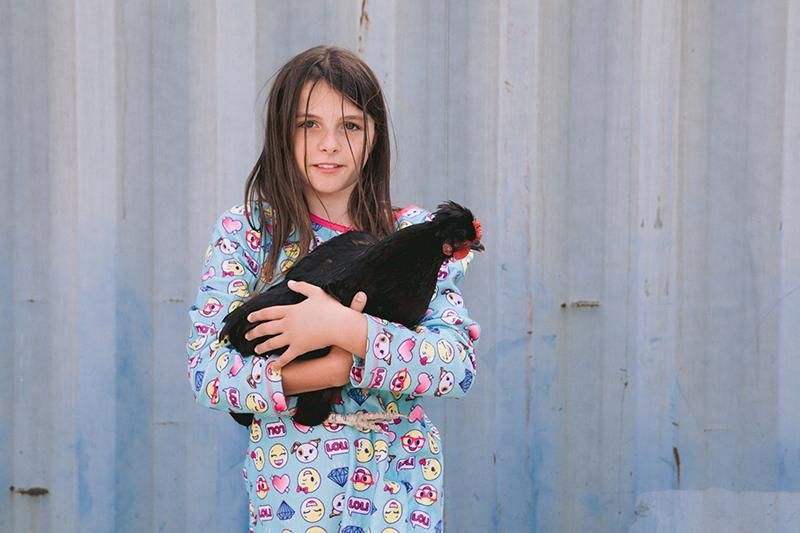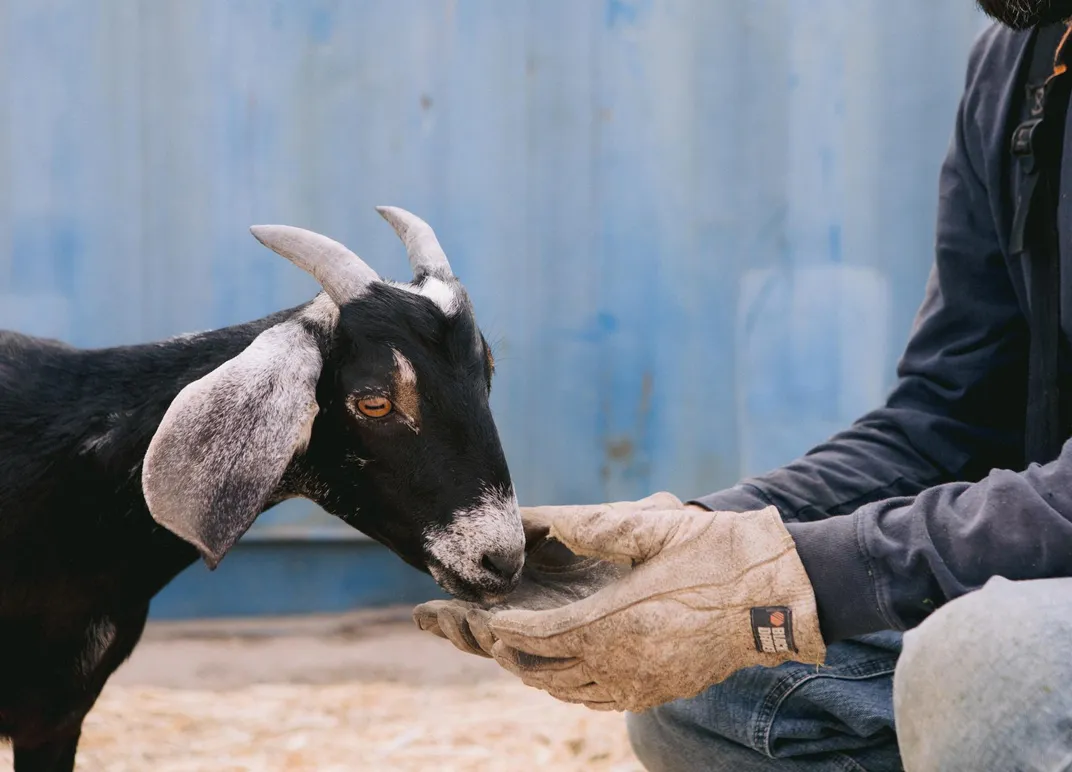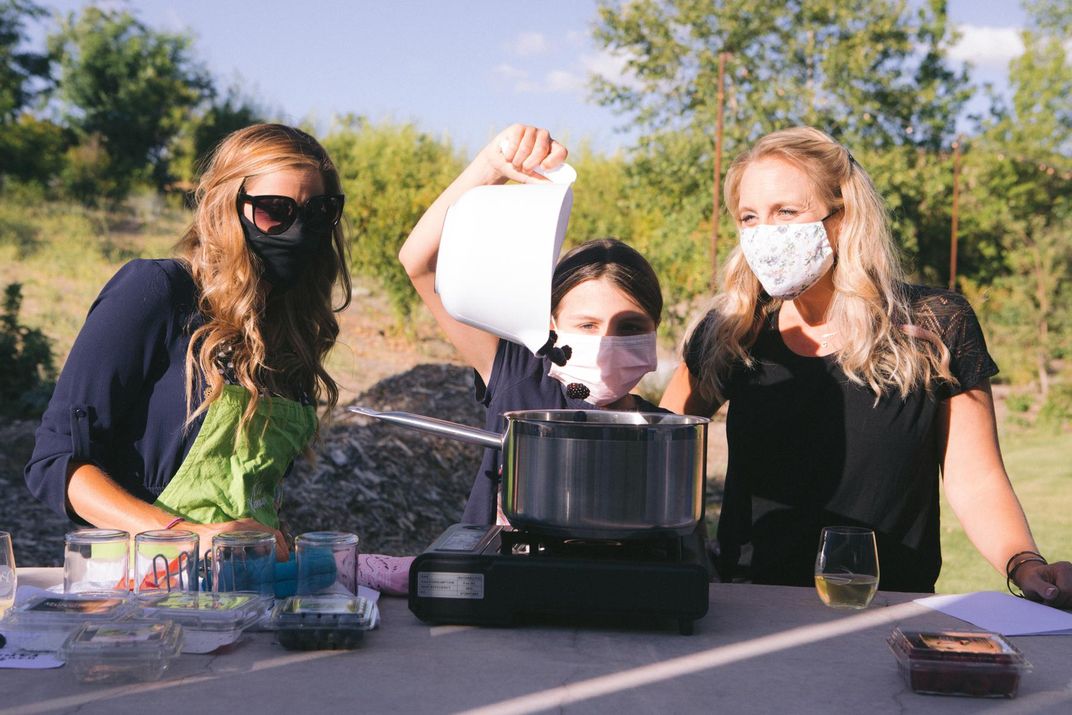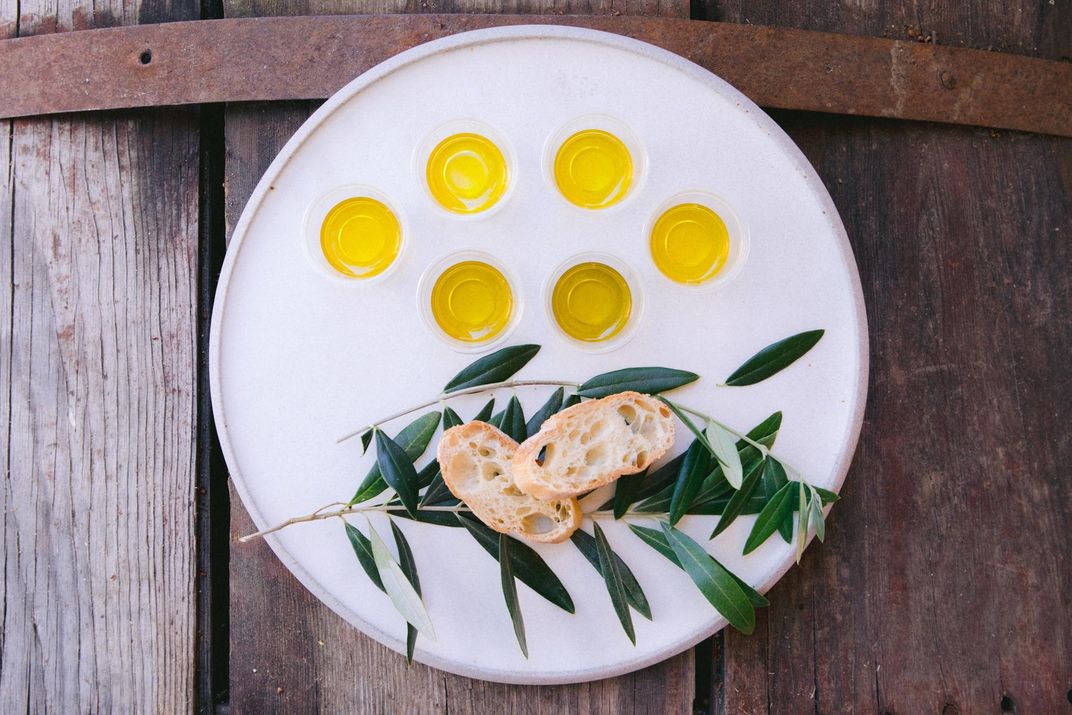Small Farms Find Creative Ways to Attract Visitors During the Coronavirus Pandemic
From curbside produce pickup to reservation-only classes, farms are adapting to make ends meet
/https://tf-cmsv2-smithsonianmag-media.s3.amazonaws.com/filer/4b/83/4b83acdb-5477-463e-b3fd-b10586cceaf3/jam_making_class_yvette_roman_photography.jpg)
When shelter-in-place restrictions hit North Carolina this past March, Beverly Mooney—owner of Millstone Creek Orchards in Ramseur—knew she had to figure out a way to adapt quickly. “My business was considered an essential food source,” she says, “but with only a bakery and cannery on site, it really limited me on what I could offer.”
Mooney began reaching out to other small farmers and food producers in the area, seeing whether they'd like to be a part of the orchard's new Apple Barn Mobile Market, which pulls together products from various local farms and delivers them directly to customers. “In the beginning we had one person selling their farm's sausage, another selling eggs, and a woman who provided us with beautiful microgreens that she usually sold to restaurants,” says Mooney. The Apple Barn Mobile Market has since grown to a few-dozen products, including fresh goat cheese from nearby Goat Lady Dairy, tomatoes from Twin Oaks Produce, and Liberty Kettle Corn from local purveyor Becky Suphin, who says her sales are up 50 percent from what they would be during the pandemic without the market. It's just one of the innovative ways that Mooney has reworked her property's offerings in the age of COVID-19—others include a socially distant farmers' market, pick-your-own fruit that allows adequate space between participants and a reservation-only “behind-the-scenes” farm tour.
With U.S. tourists currently barred from visits to the European Union and states slowly beginning to reemerge from lockdown, residents across the country are looking for travel experiences much closer to home. This includes agritourism, in which working farms, ranches, orchards and other agricultural properties offer hands-on activities and other visitor incentives to supplement business. In fact, the Visit NC Farms app, which officially launched in January 2020, had 4,630 downloads in May, up from 726 downloads in March. But as farmers adjust to new COVID-19 rules and restrictions, they're having to find new and innovative ways to attract visitors, whether it's curbside produce pickup, socially-distanced farm stays or even a farm experience drive-through, allowing families to view the production of seasonally changing crops and visit with farm animals—all from the safety of their vehicle.

“[Now that travel restrictions are loosening], we're seeing that people want to jump in their cars and go out,” says Lynette Sonne, founder of FARMstead ED, which pairs visitors with onsite and educational hands-on farm experiences, like learning how to grow and harvest your own cocktail garden, throughout California's San Luis Obispo County. “Being on a farm in summer gives people a sense of relief and calm they likely haven't felt in a while, and the open-space feels like a safe zone,” Sonne says. “Also, with CSA programs and food delivery in demand throughout this pandemic, we're finding more and more people asking, 'Where is my food coming from?' They're getting much more in touch with the things they eat.”
Katrina McAlexander runs Mt. View Orchards, a third-generation apple and pear farm spread across 50 acres in Oregon’s fruit-filled Hood River Valley. Like most small farms, says McAlexander, Mt. View had already learned they needed to diversify pretty dramatically pre-COVID to make the property economically feasible—making beer, wine and hard cider onsite and opening their own eatery in 2019 where they serve up farm-fresh gelato and gourmet pizzas. So when the state issued “stay-home” orders in March, they were ready to adapt. “Pizza is already such a popular to-go food,” McAlexander says, “So when COVID came we immediately shifted to take-out only, including growlers of cider. The biggest challenge we faced was sourcing ingredients, like finding flour for our pizza doughs.”

On May 15, Mt. View Orchards reopened to the public, though with COVID restrictions in place. “It's caused us to be really scrappy,” says McAlexander, “and creatively problem-solve. We look at what we've got and think, what can we do with it?” For example, the property features a wooden pavilion for farm-to-table weddings, but with new restrictions on the number of attendees, McAlexander decided to take the venue's picnic tables and relocate them across the lawn area, spacing some of them as much as 50 feet apart. “It immediately took off,” she says, “We have a lot of people that bring their kids or their pups, and enjoy the open air.” There's also a mental-health component that McAlexander, who's also a nurse practitioner, believes is attracting visitors to the property. “People just need to get outdoors,” she says.
In Albuquerque, New Mexico, the 25-acre Los Poblanos Historic Inn and Organic Lavender Farm is also finding inventive new ways to keep business going. “One of the most exciting things we've done is adding a lavender hand sanitizer to our product offerings,” says Lauren Kemner, Los Poblanos' marketing manager. It's even become an amenity in each of the inn's 50 guest rooms, half of which have been reopened for overnight stays. The property is also offering a new in-room dining option, and allowing guests to assist with the annual lavender harvest, which is currently in full-swing.

“It's a hands-on experience that would typically be open to the public,” Kemner says, “but right now we're being really cautious, so at this point it's for lodgers only.” They've also put together a small group summer wellness retreat July 19-22 to celebrate lavender season, complete with skincare workshops, cocktail demos and farm tours—all socially distanced, of course.
Sonne, of FARMstead ED, says COVID-19 has really forced those in the agritourism industry to be nimble. “We're calling the new normal the ‘now normal,’” she says. “Because it's changing every day.” Along with fluctuating restrictions, “We’re still figuring out people's boundaries and where their comfort levels are as far as what they want to do and what they're willing to do.”Typically, FARMstead ED offers things like jam making sessions at a local farm, and learning how to create the perfect cheeseboard selection, complete with pairings from a San Luis Obispo County winery. For now, this means putting together custom private experiences (“our version of 'by appointment only'” says Sonne) for guests that unite them with local farmers and food producers, and “go well beyond your typical farm tour,” Sonne says.

Under new COVID-19 restrictions, “a family will come in and say, 'I'm staying at this Airbnb—just my family,” says Sonne. “'Can you help us put a custom workshop together and do something privately?'” FARMstead ED has four or five pre-COVID experiences that already make sense and can be done for smaller groups. They offer hands-on soap making, goat milking and felting at Giving Tree Family Farm in Santa Margarita, for example, or an olive oil tasting called Inside the Olive, which takes place at SLO’s The Groves on 41 and Olea Farms (each 10 minutes from the other). The tasting can either be booked as an onsite small-group private tour or done at home with a tasting kit (available for shipping), including four different olive oils, a couple of tasting glasses, and even tasting mats and note cards for the full tasting experience.
“It's strange and you almost feel a little guilty sometimes saying it,” says Mooney, of Millstone Creek Orchards, “but we're actually way ahead financially of anything we've ever been for this season before—though it's in large part because of peoples’ limited travel options and their need to get outside.”
She adds, “Still, I don’t want to get too confident. My philosophy this year has been nose to the ground, and look at what's right in front of me before going into what's next. We’re just taking it day by day.”
/https://tf-cmsv2-smithsonianmag-media.s3.amazonaws.com/accounts/headshot/LauraKiniry.png)
/https://tf-cmsv2-smithsonianmag-media.s3.amazonaws.com/accounts/headshot/LauraKiniry.png)